Jehoiakim Burns Jeremiah's Scroll
Comments for Study 27
Pick to read this Bible passage in a separate window.
SORRY, THE COMMENTARY FOR THIS STUDY IS NOT FINISHED.
CLICK HERE FOR A LIST OF BOOKS THAT ARE COMPLETED.
I. Baruch Writes (36:1-10)
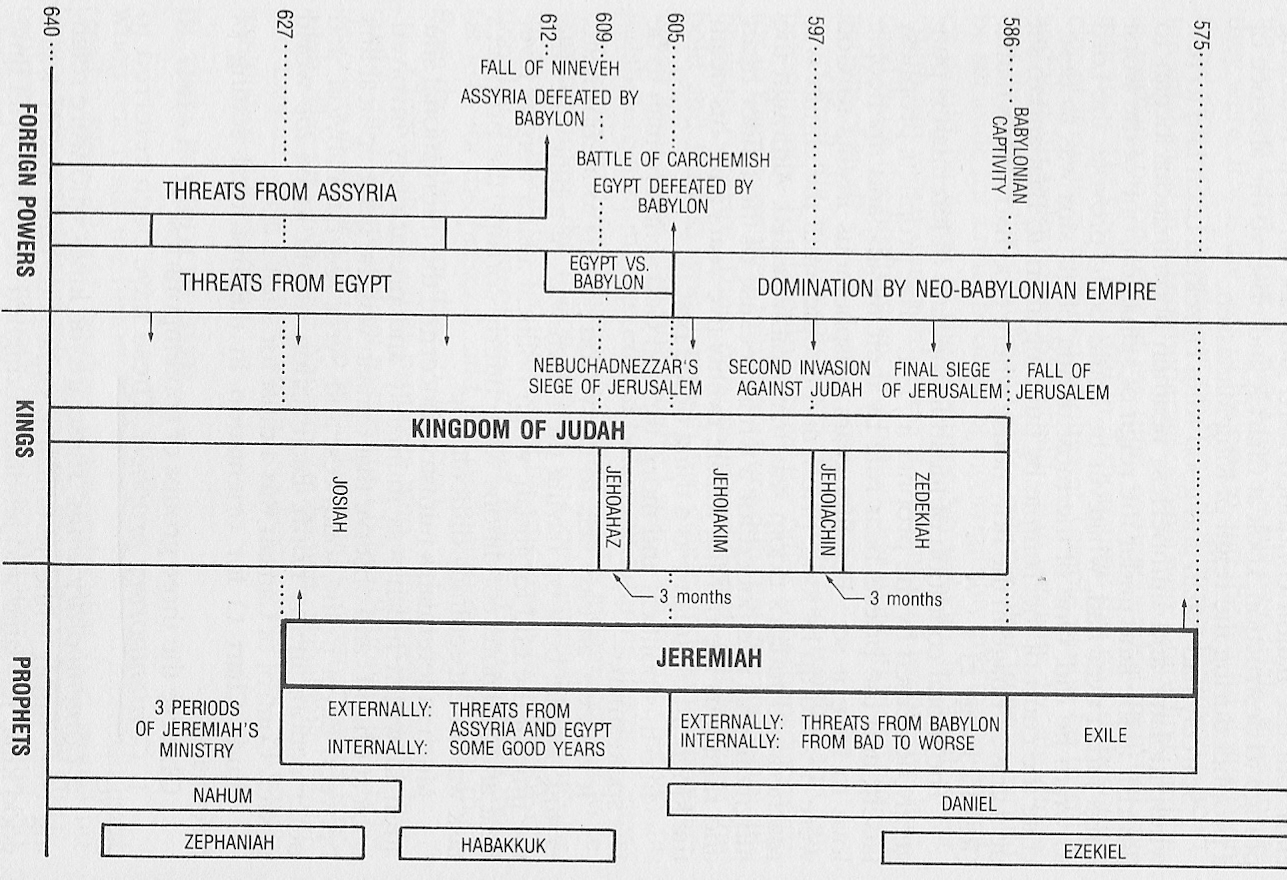
>1. When did the events in this chapter take place? (1, 9)
* Jeremiah 36:1 "In the fourth year of Jehoiakim son of Josiah king of Judah, this word came to Jeremiah from the LORD:"
* Jeremiah 36:9 "In the ninth month of the fifth year of Jehoiakim son of Josiah king of Judah, a time of fasting before the LORD was proclaimed for all the people in Jerusalem and those who had come from the towns of Judah."
* If the book were in chronological order, chapter 45 would appear in-between verses 8 and 9.
* "Jehoiakim son of Josiah" -Jehoiakim (609-597 B.C.) was ambitious, cruel and corrupt. (2 Kings 23:36-37; 2 Chronicles 36:2-8) Egypt's Pharaoh Neco made Eliakim son of Josiah king in place of his father Josiah and changed Eliakim's name to Jehoiakim. Jehoiakim paid Pharaoh Neco the silver and gold he demanded. In order to do so, he taxed the land and exacted the silver and gold from the people of the land according to their assessments. (2 Kings 23:33-34) In the third and fourth years of his reign Babylon defeated Egypt and besieged Jerusalem.
* 2 Kings 23:36-24:7 "Jehoiakim was twenty-five years old when he became king, and he reigned in Jerusalem eleven years. His mother's name was Zebidah daughter of Pedaiah; she was from Rumah. And he did evil in the eyes of the LORD, just as his fathers had done. During Jehoiakim's reign, Nebuchadnezzar king of Babylon invaded the land, and Jehoiakim became his vassal for three years. But then he changed his mind and rebelled against Nebuchadnezzar. The LORD sent Babylonian, Aramean, Moabite and Ammonite raiders against him. He sent them to destroy Judah, in accordance with the word of the LORD proclaimed by his servants the prophets. Surely these things happened to Judah according to the LORD's command, in order to remove them from his presence because of the sins of Manasseh and all he had done, including the shedding of innocent blood. For he had filled Jerusalem with innocent blood, and the LORD was not willing to forgive. As for the other events of Jehoiakim's reign, and all he did, are they not written in the book of the annals of the kings of Judah? Jehoiakim rested with his fathers. And Jehoiachin his son succeeded him as king. The king of Egypt did not march out from his own country again, because the king of Babylon had taken all his territory, from the Wadi of Egypt to the Euphrates River."
* 2 Chronicles 36:5-8 "Jehoiakim was twenty-five years old when he became king, and he reigned in Jerusalem eleven years. He did evil in the eyes of the LORD his God. Nebuchadnezzar king of Babylon attacked him and bound him with bronze shackles to take him to Babylon. Nebuchadnezzar also took to Babylon articles from the temple of the LORD and put them in his temple there. The other events of Jehoiakim's reign, the detestable things he did and all that was found against him, are written in the book of the kings of Israel and Judah. And Jehoiachin his son succeeded him as king."
* Daniel 1:1-3 "In the third year of the reign of Jehoiakim king of Judah, Nebuchadnezzar king of Babylon came to Jerusalem and besieged it. And the Lord delivered Jehoiakim king of Judah into his hand, along with some of the articles from the temple of God. These he carried off to the temple of his god in Babylonia and put in the treasure house of his god. Then the king ordered Ashpenaz, chief of his court officials, to bring in some of the Israelites from the royal family and the nobility"
* "In the fourth year" -605 B.C. The events in this chapter take place before the events in chapters 32 to 35 (32 states "tenth year", see introduction); the theme is the same so it is placed here.
* Babylon and Judah counted king's reigns differently. According to the Babylonian system of computing the years of a king's reign, the third year of Jehoiakim would have been 605 B.C. (Daniel 1:1), since his first full year of kingship begun on New Year's Day after his ascension in 608 B.C. But according to the Judahite system, which counted the year of ascension as the first year of reign, this was the fourth year of Jehoiakim (Jeremiah 25:1, 46:2) Also note that the Babylon and Hebrew calendars had different months and began the year at different times.
* "the ninth month" -This is the ninth month of the Hebrew calendar and is December according to the modern Gregorian calendar.
* "of the filth year" -604 B.C.
* Nebuchadnezzar had been fighting against Egypt at Carchemish since he defeated the Assyrians in 612 B.C., nearly eight years total. (2 Chronicles 35:30) Nebuchadnezzar defeated Egypt in 609 B.C. and thus Jerusalem came under his control. Nebuchadnezzar's final defeat of Egypt was in 605 B.C. Quickly after defeating Egypt he returned to Jerusalem and besieged it because King Jehoiakim had rebelled against him thinking that Egypt was going to save them from Babylon's rule. (2 Kings 23:36-24:17; 2 Chronicles 36:6) During the 605 B.C. siege Nebuchadnezzar's father died; so he quickly returned to Babylon to be crowned king and then quickly returned to Jerusalem to continue the siege.
* "a time of fasting before the LORD was proclaimed for all" -Probably because of Babylon's siege. Outwardly they seemed to seek the Lord because of religious activities, but as this chapter proves their hearts were far from God and their daily lives were full of sin.
* Jeremiah 36 and 45 are about the same event. The short chapter 45 belongs between chapter 36 verses 8 and 9.
Jehoiakim had been King for 4 years when the Lord told Jeremiah to write down all the words the Lord had told him to say from the time that he was called to now. Baruch wrote down the words as Jeremiah recalled them. Baruch was told to go to the temple and read all the words on the scroll. He did so for months, perhaps a year.
When Baruch heard all the words of the Lord as he wrote he became concerned and full of sorrow and pain. He pittied himself. Self pitty is a false comfort that only pulls one deeper in the pit of despair and anger. Self pity never heals. It can kill. Self pity is a choice, a decision to think, "Woe to me." Self pity is like a python that slowly tightens its grip, bringing more pain, taking away the ability to breath, and eventually kills and devorors.
Hope is the cure to self pity. Hope is a conscious decision that things can and will get better. But how to have hope?
For Baruch hope was found in the Lord's words, "wherever you go I will let you escape with your life." With these words Baruch read and reread Jeremiah's words at the temple. This caught the ears of the leaders of the city and eventually was read to the king who burned the scroll. Baruch was protected.
The words of God can help cure self pity if I believe and live them. If I apply Jesus's teaching he promises that I will be like a tree planted along the side a stream. I will be full of green life, tall and strong, and bear much fruit. It is up to me. I have to choice to remain in Jesus for he and his words are living water.
>What was Jeremiah instructed to do? (2, 30:1-2)
* Jeremiah 36:2 "Take a scroll and write on it all the words I have spoken to you concerning Israel, Judah and all the other nations from the time I began speaking to you in the reign of Josiah till now."
* Jeremiah 30:1-2 "This is the word that came to Jeremiah from the LORD: "This is what the LORD, the God of Israel, says: 'Write in a book all the words I have spoken to you."
* Chapter 30 and 36 start out with the Lord telling Jeremiah to write his words on a scroll. However, the words and content that follows is different. Chapters 30 to 33 are about Israel's restoration and consolidation. Chapters 34-39 document Jerusalem's seige and fall. Chapters 40-45 are after the fall.
*
*
*
*
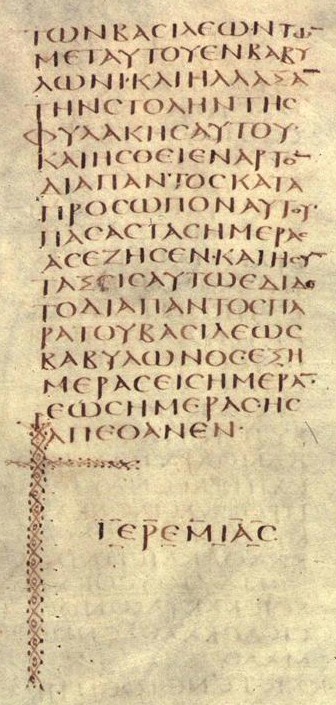
* See an old Greek manuscript of Jeremiah known as the Sinaiticus to the right. The Sinaiticus is a 4th century complete Bible that contains a shorter version of Jeremiah as do some of the Dead Sea Scrolls. The Codex Sinaiticus (its longer name) came to the attention of scholars in the 19th century at the Greek Orthodox Monastery of Mount Sinai.
>Why? (3)
* Jeremiah 36:3 "Perhaps when the people of Judah hear about every disaster I plan to inflict on them, each of them will turn from his wicked way; then I will forgive their wickedness and their sin."
*
*
*
*
*
>What is a word that means "turn from"?
* "turn from" -In Hebrew "shoob" meaning return, turn back/away, back away, withdraw, retreat, and restore (to the starting point). The modern equivalent is repent.
* "wicked way" -In Hebrew "ra". Ra is a name for Egypt's (especially Heliopolis) sun god, their mythology's creator. Ra is typically represented as a hawk-headed man bearing on his head the solar disk and the uraeus (sacred asp, venomous snake). Ra is also a Arabaic word of the same meaning as the Hebrew word.
* "I will forgive their wickedness and their sin"
*
*
*
*
>2. Who had the Lord provided to write Jeremiah's words? (4-5)
* Jeremiah 36:4-5 "So Jeremiah called Baruch son of Neriah, and while Jeremiah dictated all the words the LORD had spoken to him, Baruch wrote them on the scroll. Then Jeremiah told Baruch, "I am restricted; I cannot go to the LORD's temple."
*
*
*
*
*
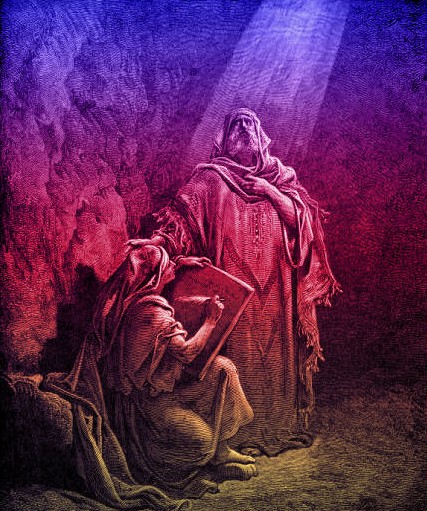
* See an drawing of Jeremiah dictating to Baruch by Dore to the right.
>What did Jeremiah tell him to do? (6-7)
* Jeremiah 36:6-7 "So you go to the house of the LORD on a day of fasting and read to the people from the scroll the words of the LORD that you wrote as I dictated. Read them to all the people of Judah who come in from their towns. Perhaps they will bring their petition before the LORD, and each will turn from his wicked ways, for the anger and wrath pronounced against this people by the LORD are great."
*
*
*
*
*
>Where did Baruch read the scroll? (8, 10)
* Jeremiah 36:8 "Baruch son of Neriah did everything Jeremiah the prophet told him to do; at the LORD's temple he read the words of the LORD from the scroll."
* Jeremiah 36:10 "From the room of Gemariah son of Shaphan the secretary, which was in the upper courtyard at the entrance of the New Gate of the temple, Baruch read to all the people at the LORD's temple the words of Jeremiah from the scroll."
* If the book were in chronological order, chapter 45 would appear in-between verses 8 and 9.
*
*
*
*
II. Baruch Reads (36:11-19)

>3. Who eventually was read the word of the Lord through Jeremiah? (11-15)
* Jeremiah 36:11-15 "When Micaiah son of Gemariah, the son of Shaphan, heard all the words of the LORD from the scroll, he went down to the secretary's room in the royal palace, where all the officials were sitting: Elishama the secretary, Delaiah son of Shemaiah, Elnathan son of Acbor, Gemariah son of Shaphan, Zedekiah son of Hananiah, and all the other officials. After Micaiah told them everything he had heard Baruch read to the people from the scroll, all the officials sent Jehudi son of Nethaniah, the son of Shelemiah, the son of Cushi, to say to Baruch, "Bring the scroll from which you have read to the people and come." So Baruch son of Neriah went to them with the scroll in his hand. They said to him, "Sit down, please, and read it to us." So Baruch read it to them."
*
*
*
*
>How did they respond? (16)
* Jeremiah 36:16 "When they heard all these words, they looked at each other in fear and said to Baruch, "We must report all these words to the king."
*
*
*
*
*
>What did they suspect about the source? (17)
* Jeremiah 36:17 "Then they asked Baruch, "Tell us, how did you come to write all this? Did Jeremiah dictate it?"
*
*
*
*
*
>4. What did Baruch confess?
* Jeremiah 36:18 "Yes," Baruch replied, "he dictated all these words to me, and I wrote them in ink on the scroll."
*
*
*
*
>Why do you think the religious leaders told him and Jeremiah to hide?
* Jeremiah 36:19 "Then the officials said to Baruch, "You and Jeremiah, go and hide. Don't let anyone know where you are.""
*
*
*
*
*
>Why is it sometimes wise to hide? (Matthew 12:14-16, 15:21; John 6:14-15, 11:53-54)
* Matthew 12:14-16 "But the Pharisees went out and plotted how they might kill Jesus. Aware of this, Jesus withdrew from that place. Many followed him, and he healed all their sick, warning them not to tell who he was."
* Matthew 15:21 "Leaving that place, Jesus withdrew to the region of Tyre and Sidon."
* John 6:14-15 "After the people saw the miraculous sign that Jesus did, they began to say, "Surely this is the Prophet who is to come into the world." Jesus, knowing that they intended to come and make him king by force, withdrew again to a mountain by himself."
* John 11:53-54 "So from that day on they plotted to take his life. Therefore Jesus no longer moved about publicly among the Jews. Instead he withdrew to a region near the desert, to a village called Ephraim, where he stayed with his disciples."
*
III. Baruch Writes a New Scroll (36:20-32)

>5. What did the king order when he heard about the scroll? (20-21)
* Jeremiah 36:20-21 "After they put the scroll in the room of Elishama the secretary, they went to the king in the courtyard and reported everything to him. The king sent Jehudi to get the scroll, and Jehudi brought it from the room of Elishama the secretary and read it to the king and all the officials standing beside him."
*
*
*
*
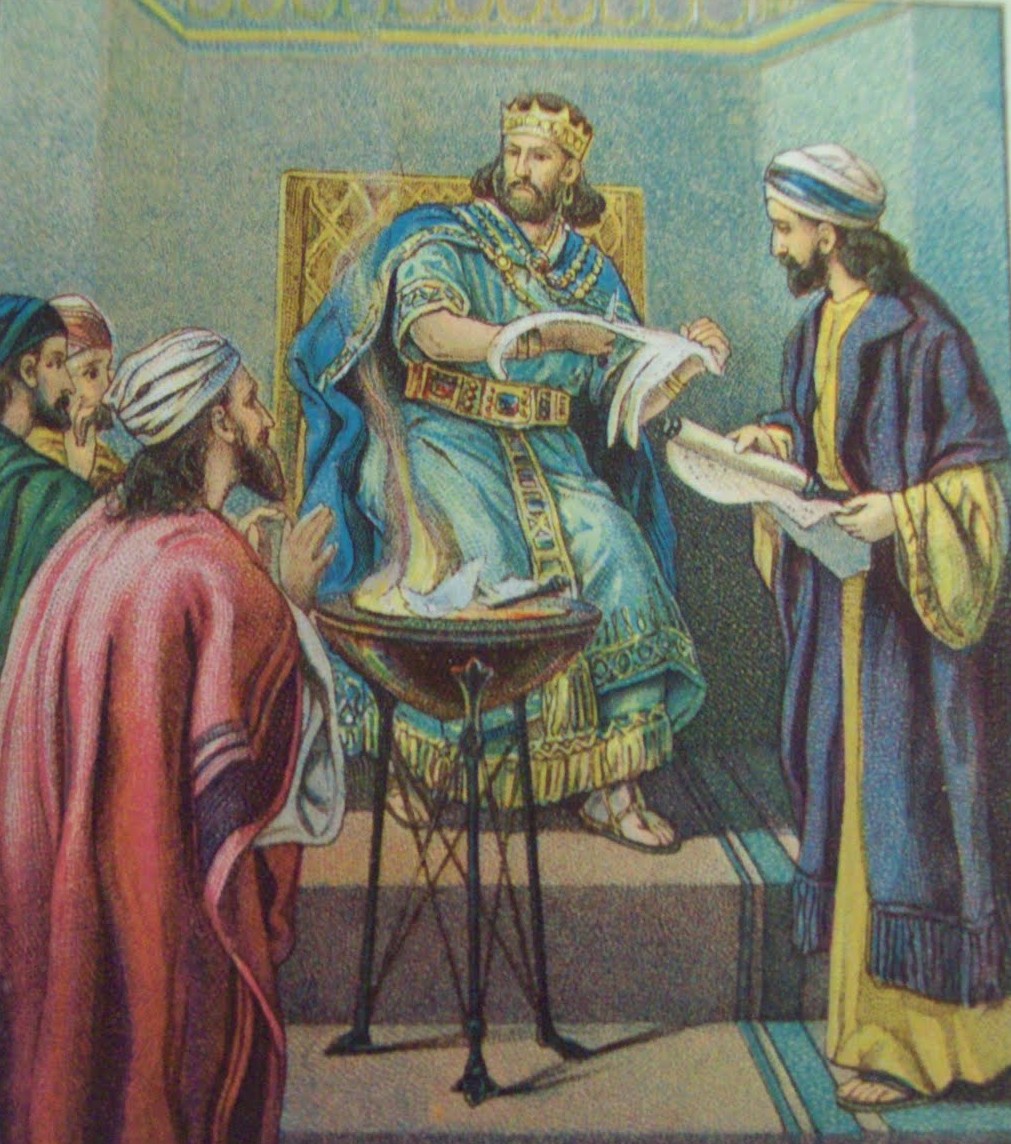
>What was he doing as the rest of the nation was fasting? (22)
* Jeremiah 36:22 "It was the ninth month and the king was sitting in the winter apartment, with a fire burning in the firepot in front of him."
* "the ninth month" -December in the modern Gregorian calendar. The same year as verse 9, 604 B.C.
* "sitting in the winter apartment" -Part of the palace in Jerusalem.
* "a fire burning in the firepot in front of him"
*
>What did he do with the word of God? (23)
* Jeremiah 36:23 "Whenever Jehudi had read three or four columns of the scroll, the king cut them off with a scribe's knife and threw them into the firepot, until the entire scroll was burned in the fire."
*
*
*
*
*
>6. What didn't they do?
* Jeremiah 36:24-26 "The king and all his attendants who heard all these words showed no fear, nor did they tear their clothes.
25 Even though Elnathan, Delaiah and Gemariah urged the king not to burn the scroll, he would not listen to them.
26 Instead, the king commanded Jerahmeel, a son of the king, Seraiah son of Azriel and Shelemiah son of Abdeel to arrest Baruch the scribe and Jeremiah the prophet. But the LORD had hidden them."
*
*
*
*
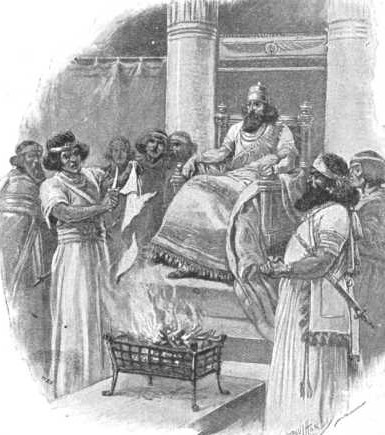
>Why?
*
*
*
*
*
>7. What did the Lord tell Jeremiah to do? (27-28)
* Jeremiah 36:27-28 "After the king burned the scroll containing the words that Baruch had written at Jeremiah's dictation, the word of the LORD came to Jeremiah:
28 "Take another scroll and write on it all the words that were on the first scroll, which Jehoiakim king of Judah burned up."
*
*
*
*
>What was the message to Jehoiakim?
* Jeremiah 36:29 "Also tell Jehoiakim king of Judah, 'This is what the LORD says: You burned that scroll and said, "Why did you write on it that the king of Babylon would certainly come and destroy this land and cut off both men and animals from it?""
*
*
*
*
*
>What can be learned about the word of God?
*
*
*
*
*
>8. What would happen to the king who burned the word of God?
* Jeremiah 36:30-31 "Therefore, this is what the LORD says about Jehoiakim king of Judah: He will have no one to sit on the throne of David; his body will be thrown out and exposed to the heat by day and the frost by night.
31 I will punish him and his children and his attendants for their wickedness; I will bring on them and those living in Jerusalem and the people of Judah every disaster I pronounced against them, because they have not listened.'"
*
*
*
*
*
>Why is Spirit filled study of the word of God so important?
*
*
*
*
*
>9. What must have Jeremiah and Baruch thought as they obeyed and wrote a new scroll?
* Jeremiah 36:32 "So Jeremiah took another scroll and gave it to the scribe Baruch son of Neriah, and as Jeremiah dictated, Baruch wrote on it all the words of the scroll that Jehoiakim king of Judah had burned in the fire. And many similar words were added to them."
*
*
*
*
*
>What does this say about the gospel mission?
*
*
*
*
*

|























